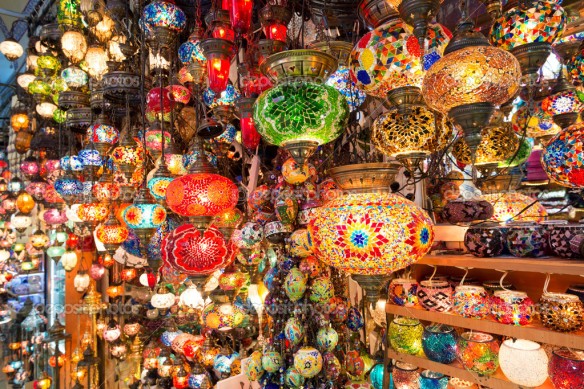 On the train to work this morning, I was flipping through a Lonely Planet Traveller issue, and taking in the sights and sounds as best as one can when experiencing distant, far-off places indirectly via stunning, glossy photographs, overall making for a dreamy Monday morning.
On the train to work this morning, I was flipping through a Lonely Planet Traveller issue, and taking in the sights and sounds as best as one can when experiencing distant, far-off places indirectly via stunning, glossy photographs, overall making for a dreamy Monday morning.
Among others, there was gorgeous, scenic photography from Norway, Kenya, Turkey, Dubai, Indonesia…the list goes on. One particular photo of colorful lanterns inside a store in Istanbul pulled me in, and the the photographer described the lights as being to him, representing the colors and unique energy of Istanbul. Apparently, these mosaic lanterns are commonly seen in Istanbul, and are made of brass and hand-cut colored glass.

Another photo showed two men bargaining at a Turkish bazaar – the Grand Bazaar – and it just got me imagining myself standing there with all of its sights, sounds, and smells. The vivid colors and people bustling about speaking in an unknown tongue.
Seeing all this reminded me that the word bazaar is in fact Persian in origin. Living in Indonesia, I knew that the word for a traditional marketplace was pasar. But it was only when I chanced upon the origins of the word bazaar that I learned of its Persian roots, and its subsequent influence on many languages, including of course, Malay and Indonesian.
To do a little fact checking, I pulled up the Wikipedia article for bazaar, and sure enough, it was of Persian origin, dating back all the way up to Old Persian and Proto-Indo-Iranian. Reading up on the article, I suddenly wondered whether the Korean word ‘바자회’ was in fact a combination of ‘바자’ (presumably a transliteration of the word bazaar into Korean) and 회 (會, meaning ‘gathering’). A quick search on Naver dictionary provided the answers, and yes, I was right.
‘바자’ did not have Chinese character roots; in fact, it was a loanword. The added 회 (會) at the end was to denote ‘gathering’.
Seeing that the second paragraph of the Wikipedia article mentioned only North America, UK, and some other European countries as using the term bazaar to mean a sort of ‘rummage sale’, I added a short sentence at the end of the second paragraph to mention the use of the word in modern Korean as well.
I knew that anyone could edit Wikipedia articles, but had never tried it before. I just wanted to share my first Wikipedia entry.
